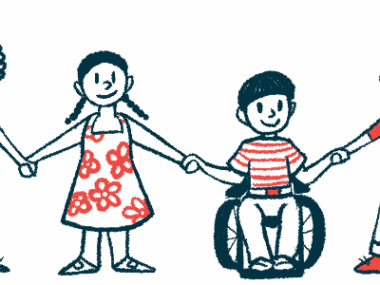The Power of a Duchenne Smile
Written by |

We can all smile, but there’s one type of smile that shows genuine positive emotion and is nearly impossible to fake. The zygomaticus major muscle in the cheek pulls the lips upward while the orbicularis oculi around the eye activate, wrinkling the outside corners of the eyes.
It’s true happiness on display. It lightens the mood of the room. It makes people smile back. Its name, as I recently learned, is unexpected. It’s called the Duchenne smile.
Guillaume-Benjamin-Amand Duchenne, a 19th-century neurologist and pioneer in electrical stimulation and the mapping of muscles, and who also discovered the disease that I have, Duchenne muscular dystrophy, first described this type of smile.
The irony is not lost on me. A degenerative, muscle-wasting condition shares the name of a smile that displays true positive emotion.
This is a circumstance I’ve been thinking about for the past couple of weeks. From my perspective, it means that even in the wake of an awful disease like Duchenne, sometimes the best thing we can do is smile. Most of my muscles don’t work right, but at least my cheeks and eyes can scrunch up in a way that tells other people around me that it’s OK, that life is still beautiful.
When I get to know new friends, they’re going to see two things that start with the same word — Duchenne muscular dystrophy and a Duchenne smile. And you can guess which one is going to make a bigger impact.
I don’t want people to pity me for being in a wheelchair. I want them to see my positivity and joy in spite of my situation. I want to be a spark that makes them rethink their life, where their priorities lie, and what truly makes them happy.
The Duchenne smile is one of many tools in my God-given toolkit, which I can use to help other people with their own struggles. My muscles don’t have the power to walk or move boulders or sprint sideline to sideline, but they certainly have the power to generate a wave of joy.
While I’ve just made this oxymoronic discovery, the connection between my disease and my smile has always existed. I get my joy and my strength not from what I can’t do, but from what I can. It comes from without — God, friends, and family. It also comes from my soul within, which temporarily resides in my failing body.
People might not understand how I can smile at all. My response is, how can you live at all without smiling?
During this time of war, uncertainty, pain, and suffering, we owe it to ourselves to smile when we can. Don’t think. Be with the people that you love. Let the Duchenne smile wash over you. Feel your facial muscles tighten, but your mind float easily among the waves.
Note: Muscular Dystrophy News is strictly a news and information website about the disease. It does not provide medical advice, diagnosis, or treatment. This content is not intended to be a substitute for professional medical advice, diagnosis, or treatment. Always seek the advice of your physician or another qualified health provider with any questions you may have regarding a medical condition. Never disregard professional medical advice or delay in seeking it because of something you have read on this website. The opinions expressed in this column are not those of Muscular Dystrophy News or its parent company, Bionews, and are intended to spark discussion about issues pertaining to muscular dystrophy.







Dell Hoff
Hawken, you are SO inspiring! I just love to read your writings, and I believe this is the most beautiful one yet.. How wonderful that the name of the this wonderful thing we all possess, a smile, is named Duchenne. Please continue to write these articles, and thanks to your Dad for posting them for so many to read and enjoy! Dell
Kenneth McGrath
Fascinating. I had never made the mental connection between the term Duchenne smile and the Muscular Dystrophy before and I found this writing insightful and full of poignant self-knowledge. Thank you for making me curious about the work of Guillaume-Benjamin-Amand Duchenne and for sharing your own experiences so clearly in words that make so much sense to me. Resonant writing!